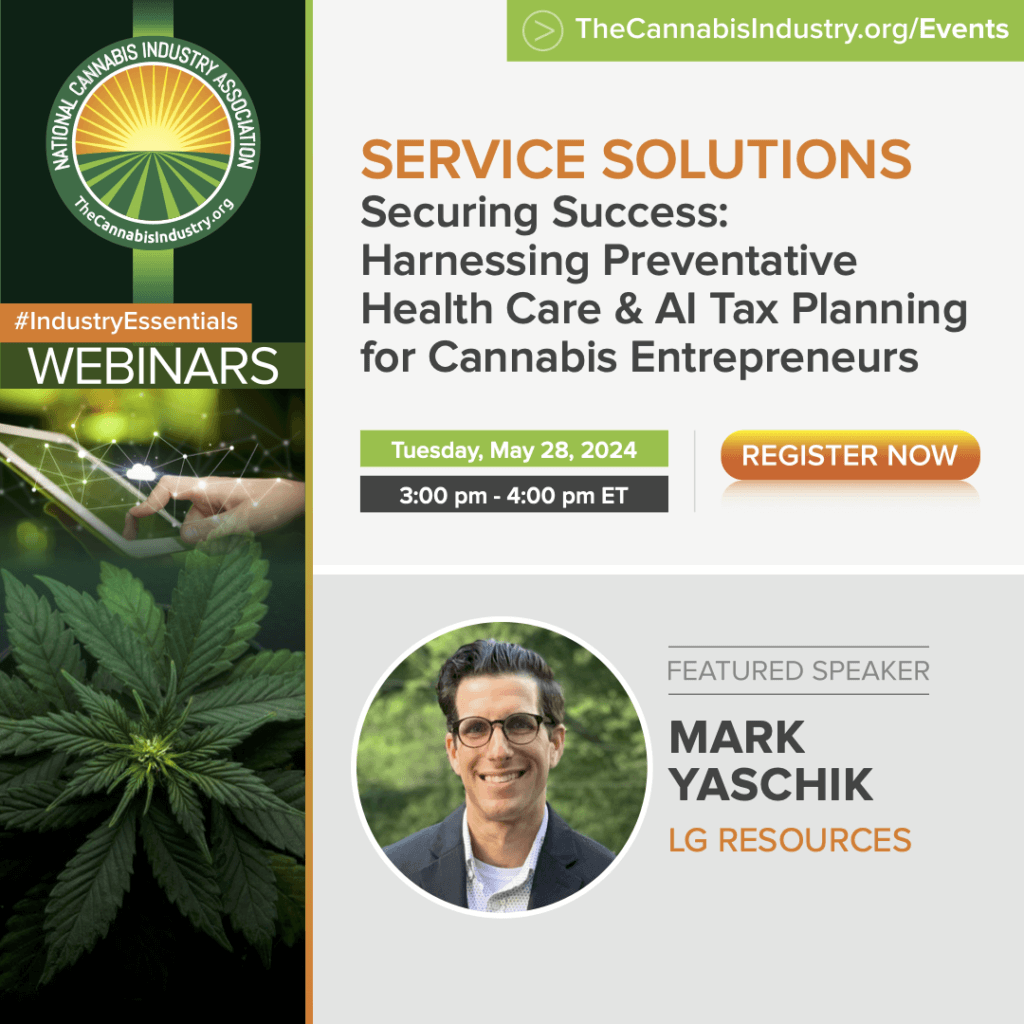Member Blog: Wellness at Work – Preventative Healthcare for Cannabis Business Owners

Navigating Challenges in the Cannabis Industry
The cannabis industry finds itself constantly grappling with challenges imposed by federal regulations and government scrutiny. Despite these obstacles, there are numerous strategies available to businesses within this sector that can mitigate fixed costs, save money, and preserve valuable staff positions.
Delivering Tangible Value
Our seasoned team, boasting a track record of saving well over $2 billion for our clients, specializes in pioneering solutions that deliver tangible value. We recognize the unique demands faced by cannabis business owners and have tailored our approach to offer seamless evaluation and implementation of our tools, ensuring minimal disruption and maximum efficiency. This commitment to excellence has earned us the trust and loyalty of nearly half of our clients, who consistently refer us to their peers and associates.
Game-Changing Healthcare Solution
For cannabis operations employing W2 staff, we offer a game-changing solution: a preventative healthcare plan meticulously designed to address the specific needs of the cannabis industry.
Zero-Cost Structure with Significant Savings
What sets our plan apart is its zero-cost structure for employers, coupled with its ability to instantly lower payroll taxes without necessitating any modifications to existing benefits packages. This makes it an ideal solution for businesses looking to enhance employee retention while simultaneously bolstering their bottom line.
Comprehensive Benefits for Employee Well-Being
The benefits offered through our plan are not only financially advantageous but also genuinely impactful. From round-the-clock telemedicine visits to access to hundreds of free generic drugs and preventative screenings, employees gain access to a comprehensive suite of resources aimed at promoting their health and well-being. This not only enhances job satisfaction but also contributes to a healthier, more productive workforce.
Efficient Implementation and Support
Implementing our program is straightforward and efficient, with many businesses up and running in just a matter of minutes. Whether you’re a small-scale operation or a large enterprise, our team is dedicated to providing the support and guidance you need to maximize the benefits of our innovative healthcare solution.
Empower Your Business Today
Take the first step toward transforming your business and empowering your employees by scheduling a brief call with us to learn more. Together, we can pave the way to a brighter, more prosperous future for your cannabis business.
Empower Your Cannabis Business: Join Our Service Solutions Webinar!
Don’t miss out on the opportunity to learn more about how to optimize your cannabis business with our innovative healthcare solution and other service solutions. Join us for our upcoming Service Solutions webinar being broadcast LIVE on Tuesday, May 28th at 3:00PM ET / 12:00PM PT featuring the LG Resources team as they unveil their latest offerings in Preventative Health Care and AI Tax Planning.

Register now to secure your spot and gain exclusive insights from industry leaders. Click here to register for this essential webinar.
Take the next step in elevating your cannabis business to new heights. We look forward to seeing you there!
Member Blog: 9 Cannabis HR Trends In 2020

by Heather Smyth, Director of Marketing at Würk
2019 was an incredible year of growth for the cannabis industry; mergers and acquisitions, multi-state expansion, new state licensing, and an explosion of new jobs created. Operationally, more businesses began adopting best practices from the retail and hospitality industries and implemented technology systems to connect all facets of business for stronger insights. There have been focused efforts on hiring, engagement, and training to improve employee retention. Plus, the momentum for widespread acceptance of cannabis legalization is truly unstoppable.
These favorable advancements haven’t come without a variety of challenges, including continued banking access stalls, compliance hurdles, and environmental tragedies. While most legal markets in the nation are struggling to keep up with the demand for qualified talent, select California enterprises laid off an average of 30% of their workforce due to numerous obstacles. Most notably, the vaping crisis shed light on the need for consistent regulation and testing. Additionally, lack of access to capital has significantly slowed down business growth nationwide.
According to a survey Wurk sent to leading enterprise U.S. cannabis businesses, the largest human resource challenge in 2019 was managing rapid growth and scaling the workforce to meet demand. Managers felt pressure to ensure hiring plans were strategic, yet could meet the constant change of the industry, and many learned that employee turnover was directly related to a lack of training and effective performance management practices.
2019 tested the resiliency, patience, and commitment of many in the industry. As 2020 begins, consider this: this is a passionate community that has the experience, determination and gumption to persevere no matter the roadblocks. As pioneers in cannabis HR, leaders are responsible for providing the right support and resources to the people of the industry, so momentum continues.
In 2020, recognize these 9 trends in cannabis Human Capital Management:
Employee Training & Performance Management
While more than half of the US has some form of cannabis legislation in place, the industry still lacks a standardized education and training program for employees in each vertical. Compliance and risk management programs have been developed by vendors like Cannabis Trainers, and states such as Massachusetts are mandating that operators take part in these sessions. A portion of marijuana businesses have created internal training programs and will invite producers in-house to offer product education to budtenders.
Although there’s been progress in this category, the industry is still a long way away from providing consistent, reliable education to employees. In the coming year, HR leaders will have self-developed or outsourced courses on compliance, at a minimum. More and more operations will expand their employee development to include product and plant specifics, responsible selling best practices, and even positive psychology coaching.
Reducing employee turnover will remain a focus for cannabis HR leaders in 2020. Operators will take a fresh look at how performance management is handled and whether it aligns with company culture. One approach to replace the annual review will be “continuous performance management,” where frequent one-on-ones are scheduled to improve communication, address issues fast, and ensure employees are engaged in the organization. HRIS platforms can support these conversations with people data so managers can combine the human interaction with trending evidence in order to spot at-risk employees before they jump ship.
Employee Experience
People are a business’s largest asset, which means not only can they be the most substantial expense, they are also the biggest revenue generator. The Employee Experience (what people encounter, observe or feel over the course of their employee journey) will begin to be a part of cannabis HR strategy into the new year. By gathering insights about this unique workforce through surveys, interviews, and conversational documentation, cannabis businesses will start to define an Employee Experience that parallels the company’s mission, vision, and values.
Forbes recently included “tending” people as an HR trend to be aware of in 2020. The idea is to cultivate employees and support their growth, rather than manage them. This intentional relationship-building practice evokes a sense of community and wellbeing. Harvard Business Review notes that tending goes a long way in mitigating the “workers as machines” phenomenon. If crucial talent feels they are just a cog in the Multi-State Operator machine or an unseen hourly inventory manager, the likelihood of them voluntarily departing the business will rise.
Standardization vs Customization
Recognition must be given to leadership in 2019 for leaning on other industries for processes to effectively manage a mostly hourly workforce. While cannabis businesses are still in start-up mode, there are labor tasks and procedures that mirror those in the fast food, hospitality, and agricultural segments that can help shape standards. There’s no need to reinvent the wheel, but it’s obvious that the intricacies involved with the seed-to-sale process require customization.
In 2020, HR will balance enforcing best practices and the need for agile, tailored decision-making. When it comes to talent acquisition, for example, a hiring manager may draft a job description that includes vital soft skills, like reliability, communication skills, organization, adaptability, and leadership. In new cannabis markets, following a cookie-cutter model won’t generate the talent pool needed to build a business.
Being innovative with tried and true methods will allow leadership to solve bottlenecks today, not in the future.
Data-Driven Decision Making
According to Deloitte’s 2018 Human Capital Trends report, 85% of companies see people analytics as a high priority, but only 42% believe they are either ‘very ready’ or ‘ready’ to meet expectations. Over the years, cannabis executives have taken action to implement a technology foundation that supports compliance, streamlines processes, and reduces cost. Yet, there is still a lot of runway left to cover.
The focus will shift from technology as a ‘nice to have’ to technology as a major transformational driver in the years to come. Organizations will recognize the benefit of all-in-one solutions that enable better business decisions based on data. Human Resources will remain on budget by comparing actual spend per department, location, and cost center to predicted payroll spend. Managers will rely on people analytics to identify what elements impact turnover and employee engagement. Even in the most fast-paced, ever-changing industry, HR professionals will have the ability to predict future trends for talent, finance, and workforce planning.
Managing Rapid Growth
Massive expansion has created immense pressure for all positions in the cannabis vertical, notably for HR professionals. With most companies growing through M&A activity, not organically, the structure of business is evolving faster than most can realistically manage. This surge will only continue in 2020, demanding the expertise of the HR department to effectively discern new opportunities and build the workforce of the future.
According to the PwC CEO survey, 77% of CEOs believe the biggest threat to their business is the lack of availability of key skills. With CEOs so concerned about talent, cannabis HR managers will shift focus to increasing productivity of their existing workforce as opposed to hiring additional staff. Data will help inform HR professionals on who the top performers are and what conditions are supporting their success.
Outsourced HR Solutions
Employee relationship management should be made a priority for every business, but in-house cannabis human resources may not be an option for all. Small businesses may wait until they reach 40 or even 75 employees before bringing on a full-time HR manager. Constantly evolving labor laws and the risks involved with cannabis payroll will drive some business owners to outsource HR services to cannabis-specific partners.
From employment taxes to employee benefits to the Fair Labor Standards Act (FLSA), there are many aspects of workforce management that owners may not have the resources or experience to maintain. In an industry already strapped for financial support, one mistake in adhering to the work and pay rules for a specific municipality can amount to a hefty fine. The risk involved with managing cannabis people is high and this liability will drive licensees to depend on cannabis-friendly HR and Payroll partners.
Diversity and Inclusion
Key states had strict requirements surrounding diversity initiatives in the cannabis application process in 2019 and this focus will only grow in the decade to come. HR departments will develop stronger D&I plans with innovative ways to recruit, to communicate the importance of unique perspectives and to support peers across the organization.
Sadly, the industry saw a decline in the number of women execs at the end of the decade. Vangst found that of the 38.5% of employees that self-identified as females in the industry, only 17.6% of these women held a “Director” or “Executive” role. This compares to 82.4% for self-identified males.
As momentum gains, the industry will continue to attract like-minded, experienced professionals from mainstream, big box corporations. This past year, KushCo Holdings appointed former Nestle and Cetera Financial Group HR Executive, Rhiana Barr, as their Chief People Officer and Harborside brought on a female HR leader from big pharma. This trend will progress as the industry continues to prove legitimacy through international acceptance and financial opportunity.
Corporate Social Responsibility
Giving back to the community has been a challenging push for cannabis businesses as many non-profit organizations and volunteer programs are still hesitant to partner with plant-touching operations. Thankfully, this trend is taking a turn in a positive direction. Take for example, Cresco Labs, who launched the SEED initiative in 2019 to “ensure that all members of our society have the skills, knowledge and opportunity to work in and own businesses in this industry.” Companies all over the nation are contributing to those most affected by the War on Drugs by donating to non-profits like Last Prisoner Project or collaborating on expungement events.
Human Resources will attract a wider talent pool and increase employee satisfaction in 2020 by providing thoughtful opportunities for employees to be involved in CSR efforts.
Wellness and Benefits Offerings
For years, marijuana businesses have had to worry about basic employee resources, like ensuring they have access to banking and can receive a direct deposit. Although this will remain a hurdle for many, more doors have begun to open for managers to offer benefits, and even 401(k). Insurance and 401(k) brokers that are transparently serving the industry are becoming more and more prevalent into the new year. While Section 280E hinders employers from offering a 401(k) match, some production-focused entities may be able to deduct contributions to their employee benefits plans, where dispensary entities may not be able to—even when they’re owned by the same parent company.
Partnering with cannabis-friendly brokers and financial advisors will only benefit HR professionals as these offerings are still difficult to obtain and execute.
They say a year in cannabis is like 7 dog years… The industry has made it this far, not without flaw and frustration, but certainly with grit and determination. Organizations have the strength to power through 2020 with a solid foundation, the right toolset, and the best people around.
 Heather is an experienced marketing professional with a demonstrated history of work in cannabis technology and digital strategy. Skilled in customer relationship management, online marketing, immersive experience design and communications, Heather brings a unique combination of creative ideation and project management. As Director of Marketing for Wurk, the first workforce management company designed specifically for the cannabis industry, Heather develops key messaging to inform the market about effective human resource management and to support the advancement of the industry. With previous experience at MJ Freeway, the leading provider of seed-to-sale software solutions for marijuana businesses, Heather brings a unique understanding of cannabis chain of custody and the various challenges operators face in this highly regulated space. Heather earned a bachelor’s degree in communication design and marketing from Metropolitan State University.
Heather is an experienced marketing professional with a demonstrated history of work in cannabis technology and digital strategy. Skilled in customer relationship management, online marketing, immersive experience design and communications, Heather brings a unique combination of creative ideation and project management. As Director of Marketing for Wurk, the first workforce management company designed specifically for the cannabis industry, Heather develops key messaging to inform the market about effective human resource management and to support the advancement of the industry. With previous experience at MJ Freeway, the leading provider of seed-to-sale software solutions for marijuana businesses, Heather brings a unique understanding of cannabis chain of custody and the various challenges operators face in this highly regulated space. Heather earned a bachelor’s degree in communication design and marketing from Metropolitan State University.
Designed specifically for the cannabis industry, Wurk allows employers to protect and streamline their operations, while providing an environment where people are a priority every step of the way. The intuitive, all-in-one solution automates the most complicated and risk-prone processes associated with hiring, scheduling, and paying employees. Learn more at enjoywurk.com.





Follow NCIA
Newsletter
Facebook
Twitter
LinkedIn
Instagram
News & Resource Topics
–
This Just In
Committee Blog: Cannabis and Cardiovascular Disease
Rooted in Community: Fox Rothschild